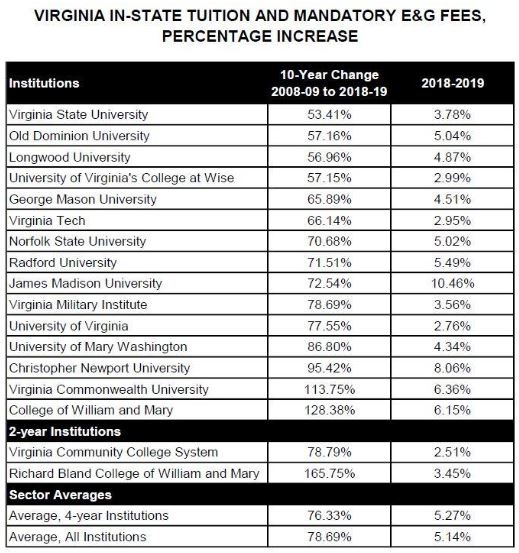by James Toscano
The year 2019 has been a historic one for public higher education in the Commonwealth. Thanks to a series of recent state and institutional policy decisions, Virginia’s colleges and universities are on a track to more transparency, accountability, and affordability.
Until this year, the trendline of skyrocketing tuition and fees in Virginia — an 80% increase over the past decade — showed no signs of slowing. In a springtime ritual, some institutions had raised tuition for 17 straight years.
Just last year, tuition and fees increased an average 5% across all public two- and four-year institutions in the Commonwealth, bumping Virginia up one spot to #6 for highest tuition and fees in the nation for public four-year institutions.
And until recently, students and families had limited opportunities to express their thoughts and concerns to those entrusted to make decisions on behalf of Virginia’s public hubs of higher learning. While many public boards and commissions have long been required by law to solicit public input through holding public comment periods, Virginia’s public colleges and universities have long been exempted from the rule.
While a small number of institutions had rules for permitting public comment at their governing board meetings, such as Longwood University and Virginia Military Institute, the vast majority did not. When Virginia Commonwealth University proposed up to an 8.1% increase in tuition and fees last year, a diverse coalition of students came together in a united stance against the hike. In the absence of a public comment period, student leaders were unable to voice their concerns to the Board of Visitors directly and were left handing paper copies of student statements and 400 petition signatures to university leaders before the board met and approved a 6.4% increase in tuition and fees.
But as it turns out, a lot can change in just one year.
Thanks to efforts by state lawmakers and institutional leadership alike, Virginia’s students and their families soon will be the beneficiaries of a temporary – but very significant – reprieve from rising college tuition. And these students and the public will have a permanent platform to influence governing board decisions.
This year, the General Assembly has allocated an additional $52.5 million in new state funding for public colleges and universities who agree to freeze in-state, undergraduate tuition and fee rates for one year. Beginning July 1, a new state law will require Boards of Visitors to hold public comment periods ahead of tuition decisions.
The response thus far from Virginia’s institutions has been overwhelmingly positive.
Earlier this week, Virginia Tech became the first institution to formally accept the General Assembly’s tuition moderation funding as the Board of Visitors voted unanimously to freeze in-state, undergraduate tuition. Last week, the college board of University of Virginia’s College at Wise voted to roll back a previously approved 3% tuition increase, a decision that is currently pending approval from the University of Virginia’s Board of Visitors.
Several other university leaders and administrations have already announced support for freezing tuition in advance of their respective board meetings, including Virginia Commonwealth University (VCU), Christopher Newport University (CNU), the College of William and Mary (W&M), George Mason University (GMU), Old Dominion University (ODU), Radford University (RU), and the University of Mary Washington (UMW).
These Boards of Visitors will meet over the next several weeks, where they will vote on proposed rates for the 2019-20 academic year. Ahead of these decisions, some boards have held public comment periods for students and members of the public — before the state mandate even takes effect.
W&M held a public comment session in March with a small group of board members present, replicating a format introduced last fall. GMU gave students a similar opportunity last week following a packed board committee meeting.
In a positive show of public accountability, VCU’s Board of Visitors welcomed public comment from students during their budget forum in the presence of the full board in March – setting the gold standard for format.

Those institutions that met the spirit of the not-yet enacted law deserve credit for their efforts.
While many board decisions are still left to be made, these last few weeks have illustrated an encouraging shift in Virginia higher education, validating Partners’ year-long advocacy campaign for tuition control and public comment requirements.
As we know, college affordability is a shared responsibility of state lawmakers and institutional leadership. And thanks to the hard-work of a broad coalition of activists this year, for now, all responsible parties are holding up their end of the bargain.
Should this trend continue, the future of Virginia higher education looks particularly bright.
James Toscano is president of the Partners for College Affordability and Public Trust, a former sponsor of Bacon’s Rebellion.


Leave a Reply
You must be logged in to post a comment.